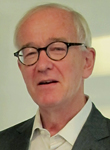Swedberg gets lifetime achievement award
By Kathy Hovis

During the 1980s, it seemed to Richard Swedberg, professor of sociology, that sociologists were coming up with better solutions than economists to some of the world’s economic challenges: They were looking at ways that non-economic factors such as culture and social structures impact the world’s economies, applying themes of gender, class and stratification.
“It makes perfect sense to combine the two areas of economics and sociology because modern society is so focused on the economy,” Swedberg said. “More and more economists have also started to work in areas where only sociologists were before.”
Swedberg’s role in the creation of the new discipline of economic sociology – was recently celebrated with a lifetime achievement award at a conference, “Economic Sociology and New Theoretical Directions,” near Uppsala, Sweden, hosted by Uppsala University and the London School of Economics.
The conference featured scholars from Europe and the U.S. and included a presentation by Swedberg, “An Elephant in the Room? Or: Can You Create a European Community Through Economic Means?”
“Without Richard Swedberg we would not have had the subdiscipline of economic sociology that we have today,” said Nina Bandelj, associate professor of sociology at the University of California, Irvine. “This is not only because Professor Swedberg is extremely prolific, writing on topics ranging from law, interest, capitalism, technology, confidence and hope, and producing books by the boxes. It is also due to his commitment and professional efforts to build the new economic sociology as a field of inquiry.”
Swedberg said part of his impetus for helping to establish economic sociology as a discipline was its novelty.
“I’ve always been attracted to topics that people haven’t dealt with,” he said. “The most interesting areas to me are in fields where few other people are working.”
After a gathering of sociologists interested in the topic in the 1980s, Swedberg and Professor Mark Granovetter of Stanford created a well-known reader for the new discipline, “The Sociology of Economic Life.” Swedberg then wrote a textbook, “Principles of Economic Sociology,” organized conferences and started to teach courses for graduate and undergraduate students in economic sociology.
Economic sociology is now well-established at all of the Ivies, Swedberg said. According to Bandelj, “the field of economic sociology has been growing rapidly in the past few decades and has found new important issues to tackle with the financial and economic crisis.”
The collaborative nature of the field is one of its draws for Swedberg. He is at work on several projects focused on capitalism, technology and hope, as they relate to the economy and society, collaborating with Cornell faculty from disciplines as varied as anthropology and science and technology studies.
“Sociology focuses on relationships and science and technology focuses on people’s interests in objects and materials, so tying those to the economy is very natural,” he said.
Swedberg is also trying novel methods in his sociology theory classes at Cornell. “Rather than lecturing to students about historical theorists, I’m trying to teach them how to theorize,” Swedberg says. After having worked through several practical exercises in theorizing, students write an auto-ethnography at the end of the semester about their experience in theorizing during the course.
For example, students in his theory class have studied whether men or women tip better (women, even if the service is bad), why groups form around their hatred of something (like Justin Bieber) and many other imaginative topics.
“Students are enthusiastic about learning this way,” he said. “It’s also a skill they can use in real life.”
Kathy Hovis is a writer for the College of Arts and Sciences.
Media Contact
Get Cornell news delivered right to your inbox.
Subscribe